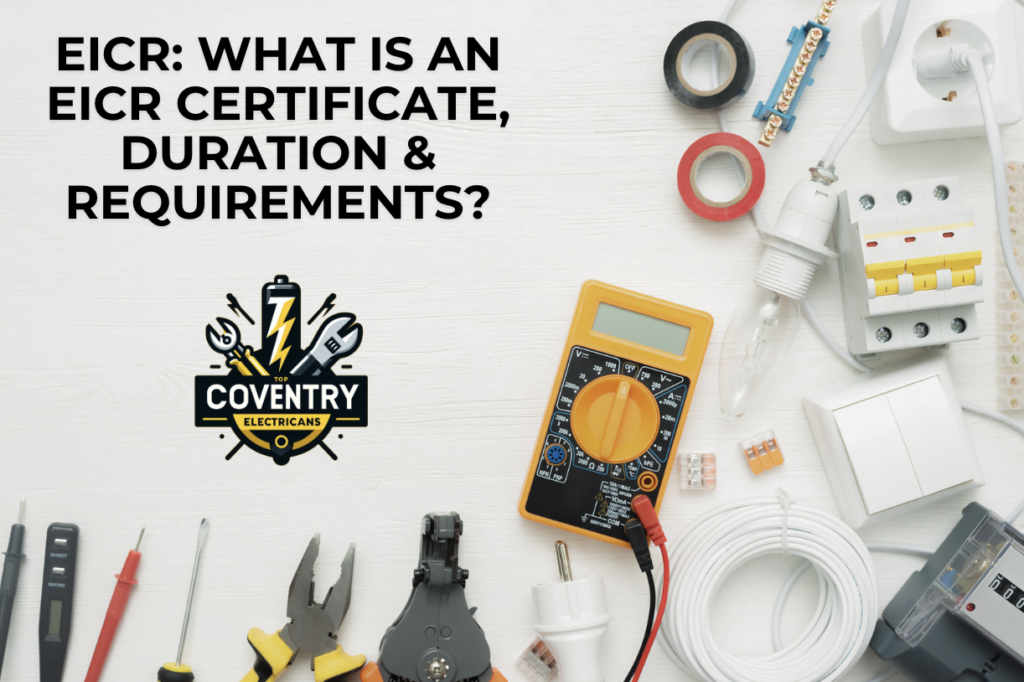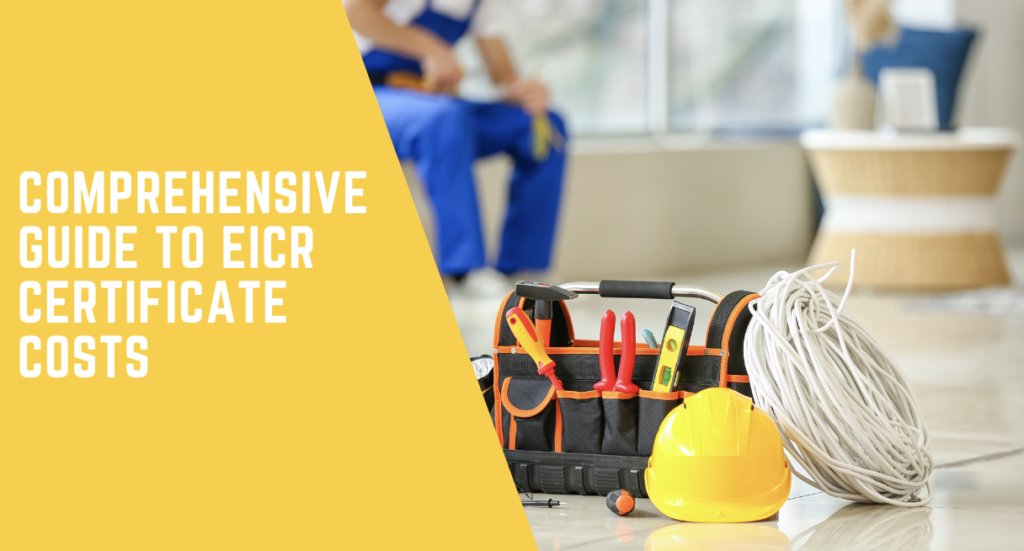

The Ultimate Guide: Do I Need An EICR To Sell My House?
- ,
- , EICR
Selling your home can be a real headache, with a million and one things to sort out. However, needing an EICR or Electrical Installation Condition Report often catches homeowners off guard. So, do you need an EICR to sell your house? Let’s break it down.
Quick Answer: Although an EICR is not a legal requirement for selling your house or flat, obtaining one can be highly beneficial.
Although you don’t strictly need this electrical safety certificate to proceed with the sale, having a valid EICR can offer prospective buyers valuable reassurance, especially if your property has older electrical installations. By providing an EICR, you demonstrate transparency and can potentially increase your home’s appeal to buyers.
Key Takeaways:
- Do I Need an EICR to Sell My House? While an EICR (Electrical Installation Condition Report) is not a legal requirement for selling a residential property, it has become increasingly common for buyers and mortgage lenders to request one. Sometimes, providing an EICR can ensure the sale is successful.
- The Importance of an EICR for Home Sellers An EICR is a comprehensive inspection of a property’s electrical installations and wiring conducted by a qualified electrician. It identifies any faults or non-compliances with current safety standards, protecting the seller and the buyer from potential electrical hazards. Having an EICR before listing your home can increase its value, appeal, and transparency for prospective buyers.
- Consequences of Not Having an EICR Skipping the EICR process can have serious implications. Failing to disclose known electrical faults or issues could be considered misrepresentation under the Property Misdescriptions Act, potentially leading to legal consequences. Additionally, buyers may use the lack of an EICR as leverage to negotiate a lower purchase price or even walk away from the sale altogether.
What is an EICR (Electrical Installation Condition Report)?
An Electrical Installation Condition Report is a comprehensive inspection of your property’s electrical installations and wiring. A qualified electrician will check every nook and cranny, testing and grading each element to ensure it meets current safety standards. Think of it as a full MOT for your electrics.
Do I Need an EICR to Sell My House?
While there’s no legal requirement to have an EICR when selling a property, it’s becoming increasingly common for buyers (and their mortgage lenders) to request one. After all, no one wants to move into a potential fire hazard!
| Category | Details |
|---|---|
| When is an EICJ Required? | – Selling a house: Not legally required, but often requested by buyers or lenders. |
| – Rental properties, HMOs, commercial: Legally required. | |
| Benefits of Having an EICR | – Offers reassurance to prospective buyers. |
| – Increases property appeal and potential value. | |
| – Demonstrates transparency in sale negotiations. | |
| Consequences of Not Having an EICR | – Potential for legal issues under the Property Misdescriptions Act. |
| – May reduce the home’s selling price due to buyer negotiations. | |
| – Could result in the sale falling through. | |
| Cost and Details Covered in an EICR | – Cost: Typically £100 to £400, depending on the size of the property, age and complexity of electrical installations, and the electrician’s rates and location. |
| – Covers: Inspection of all electrical circuits and installations, identification of any faults, and recommendations for necessary repairs. |
Do I Need an EICR to Sell My House?
While there’s no legal requirement to have an EICR when selling a property, it’s becoming increasingly common for buyers (and their mortgage lenders) to request one. After all, no one wants to move into a potential fire hazard!
The Buyer Wants the Electrics Tested: Do I Have to Oblige?
Here’s the thing – buyers have every right to ask for an EICR before they’ll consider purchasing your home. And let’s be honest, you’d probably do the same if you were in their shoes. While you’re not legally obligated to comply, refusing could seriously jeopardise the sale. It’s generally wise to bite the bullet and get the report done.
Can I Sell My House with an Unsatisfactory EICR?
Okay, so you’ve had the EICR carried out, and the results aren’t exactly sparkling. Don’t panic just yet! While an unsatisfactory report may raise some red flags, it doesn’t necessarily mean the sale is doomed. You’ll likely need to:
- Rectify any ‘Code 1’ faults (i.e., immediate dangers) identified in the report
- Provide the buyer with a quote for addressing any ‘Code 2’ faults (potentially hazardous issues)
- Negotiate a selling price that accounts for the necessary repairs
Remember, transparency is key here. As long as you’re upfront about the situation and willing to make amends, a solution can usually be found.
Speaking about codes, if you want to dig a little deeper into EICR Codes, why not take a read at our helpful guide – EICR Codes | C1, C2, C3 & FI Meanings Explained
When is an EICR Required for Selling or Renting?
While not mandatory for regular home sales, there are instances where an EICR is a legal requirement:
- Rental properties (both private and social housing)
- Houses in Multiple Occupations (HMOs)
- Certain types of commercial properties
If you’re a landlord or managing an HMO, ensure you’re up to speed with the latest regulations and have a valid EICR.
Who Can Issue an EICR, and What's the Process?
Only a qualified and registered EICR electrician can carry out an EICR. They’ll typically:
- Visually inspect all accessible electrical installations
- Test and assess each element (e.g., wiring, sockets, lighting, etc.)
- Grade any faults or issues using a coding system
- Please provide a detailed report outlining their findings
It’s a thorough process, so be prepared to give them full access to your property.
How Much Does an EICR Cost, and What's Included?
The cost of an EICR can vary depending on factors like:
- The size of your property
- The age and complexity of your electrical installations
- The electrician’s rates and location
As a rough guide, you’re probably looking at anywhere from £100 to £400 for a typical residential property. But it’s worth every penny for the peace of mind it provides.
The report itself will cover:
- A breakdown of each electrical circuit and installation
- Details of any faults or non-compliances identified
- Coding and classification of these issues
- Recommendations for remedial work (if required)
Benefits of Getting an EICR Before Listing Your Home
While not essential, there are several advantages to having an EICR carried out before you even put your home on the market:
- You can address any electrical issues in advance
- Potentially increase your property’s value and appeal
- Provide reassurance and transparency to prospective buyers
- Avoid delays further down the line when offers start coming in
It’s a proactive approach that pays dividends in the long run.
Consequences of Not Having an EICR for Home Selling
Let’s say you decide to skip the EICR altogether. What’s the worst that could happen? Apart from potentially endangering the new homeowners, you could also find yourself in a legal pickle.
Failing to disclose known electrical faults or issues is considered misrepresentation under the Property Misdescriptions Act. Not exactly the kind of baggage you want to be taking into your new life chapter.
As a Buyer, Should I Request an EICR?
On the flip side, requesting an EICR is an absolute must if you’re looking to purchase a property. Sure, it seems like an added expense, but it could save your life (not to mention a hefty repair bill further down the road).
Don’t just take the seller’s word for it; insist on having a qualified electrician give the place a thorough once-over. That way, you’ll know exactly what you’re getting yourself into electrically.
FAQs
We know you’ve got questions, and we’ve got answers! Here are some frequently asked questions about EICRs when selling your property.
Can you sell a house without an electrical certificate?
Technically, yes – there’s no legal obligation to have an EICR when selling a residential property. However, most buyers (and their mortgage lenders) will request one as part of their due diligence process. Refusing could seriously hinder or even prevent the sale from going through.
What happens if I don't have an EICR?
If selling without an EICR, you must be upfront with prospective buyers. They may still insist on having one carried out or could use the lack of a report as a negotiating tool to drive down the purchase price.
Is the EICR a legal requirement?
An EICR isn’t a legal requirement for standard residential property sales. However, it is mandatory for rental properties, HMOs, and certain commercial buildings. Find out how long an EICR lasts inn our guide here.
Do I need an EICR to buy a house?
While not a legal obligation, it’s highly recommended that buyers request an EICR as part of the purchase process. This will highlight any potential electrical issues and give you a clear idea of what you’re getting into.
How much does an EICR cost?
The cost can vary, but you typically look at around £100 to £400 for a regular residential property. Factors like the electrics’ size, age, and complexity can influence the final price.
Can I get a copy of my EICR certificate?
Absolutely! The electrician who conducted the inspection should provide you with a copy of the full EICR report and certificate. Ensure you keep this safe, as you’ll need to present it to prospective buyers or tenants.
And there you have it, folks – the ultimate guide to EICRs and selling your home. While it might seem like just another hoop, getting an Electrical Installation Condition Report could save you a lot of hassle (and cash) in the long run. So, do yourself a favour and check those electrics before selling. Your future self (and homebuyers) will thank you for it!


